|
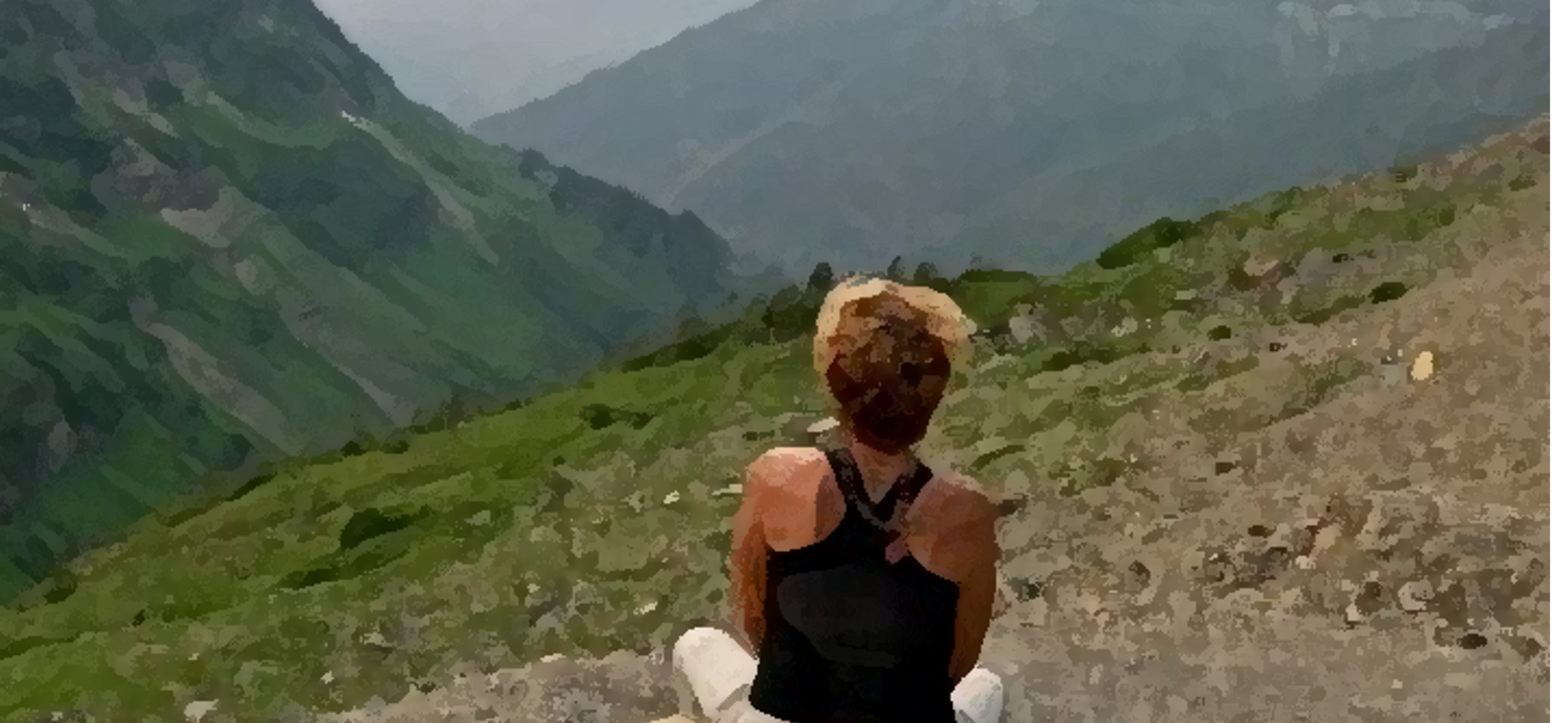
|
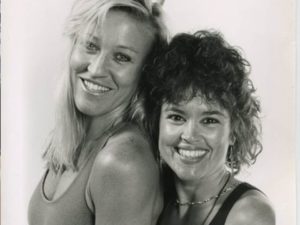
During that time I have survived the low fat, high carb craze, the long slow distance theory of fat loss, and countless wasted hours planted on a spin bike, stair climber, treadmill, all in the pursuit of a better, leaner, healthier body. The rub? I was taking a huge detour, but, I didn’t know what I didn’t know.
Going Paleo changed my life and my body.
Nine years ago I discovered a better approach to exercise, (variety), and changed my eating habits (Paleo) which finally helped put my body back in balance, helping me lose those last 10 lbs. At 50, I looked and felt better than I had in my 30’s! (I’d still just as soon be 30, with my life experience now, but we don’t always get what we want, right?)
Just as my slightly older friends had warned me, with age comes change; that not so subtle metabolic ‘clunk’ that signals another shift in your body composition, energy, and mobility.
You’d think after three hip replacements I might have a clue, but my persistently positive attitude always makes me susceptible to naivety.
Denial notwithstanding, recently, the reality of time’s passing has shown up in my ability to, well, MAINTAIN.
And I am certainly someone you might call pro-active! I eat clean, workout regularly, meditate and try to be kind to others. I practice gratitude, dammit! But all of those things still added up to this: my back hurt, I felt shitty, fat, stiff and old. Furthermore, I just noticed dimples on my biceps! WTF????
Of course, I am aware of the source: inflammation.
That’s essentially what aging is. As we get older, we “rust out,” sooner than later if we don’t watch our sugar intake, alcohol consumption, or choose to stop moving. Other things play a role too, like sleep, attitude, staying connected and engaged, and having a faith of purpose.
What I didn’t understand until very recently was also how much our environment plays a role. To be specific, I’m referring to the (literally) thousands of toxic chemicals we are exposed to daily.
The minute we step out of bed in the morning, the Toxic Party begins.

Our food, air, and water supplies are also loaded with chemicals; chemicals largely sanctioned as “acceptable” by our governmental agencies; the same organizations that were designed to protect us.
In a 2003 study performed by The Environmental Working Group (EWG) and the Icahn School of Medicine at Mount Sinai in New York City, researchers found an average of 91 industrial chemicals, heavy metals, or other significant toxins in test subjects. These chemicals included PCBs, commonly used insecticides, dioxin, mercury, cadmium, and benzene. At least 53 of these are known to suppress our immune system.

Autoimmune dysfunction is when the body gets triggered somehow to turn our own immune systems to “fight” and resist us. This can affect one organ or multiple organs which causes a myriad of diseases.
The Bottom line? We feel bloated, stressed, wired and tired. That’s not the quality of life we aspire to.




All I can say is denial is a powerful thing.

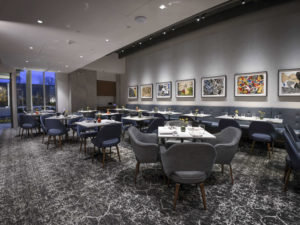
The restaurant tucked discreetly off the street, was beautiful and sophisticated, decorated in austere gray and white with floor to ceiling windows. The elegant atmosphere was just quiet enough to make it seem extra special. We followed the hostess (who looked like she was twelve) to our table and sat down, grinning because we were so excited to be out together.
We giddily nodded as our waiter delivered water, took drink orders, and recited the specials, so we didn’t immediately notice where we’d been seated. It was a corner table, one of the best in the room where we had a lovely view of everyone in the place.
It wasn’t the table that bothered us, it was the company! It looked like we were dining in an upscale nursing home! Everyone in that room was OLD!

He smiled and said, “Well, we are eating at 6:00 pm.” Leave it to Herb to be positive.
Unconvinced, I looked suspiciously around the room. This, I thought to myself, seriously sucks. Then I had a drink.
This morning I woke up with a stiff back. It’s been stiff for about three weeks, but it went rogue on me this weekend after a particularly shitty week. Undeterred, I woke up at 5 am, thudded out of bed and stubbornly did my morning meditation. Mind over matter, you know.
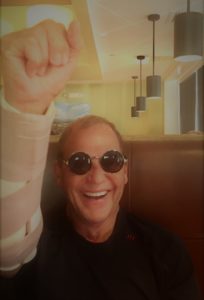
Living with the one arm bandit has had its challenges and we were both looking forward to his emancipation.
Although my back was killing me I was determined to be a good partner and make the six-hour drive. I packed my Yamuna balls, back support pillow, ibuprofen, ice packs, and favorite healing crystal to help me make the journey.
We made it as far as the county line before he turned the car around and brought me home. “This isn’t going to work,” he said, ” let’s be logical. You’re miserable and I can’t worry about you.”
So, I thought, maybe I am old.
Tomorrow I turn 59 and that’s a number an awful lot like 60, which I used to think was old. In fact, when I was a kid, my friend Duonna House told me her parents were 30, and I thought they were ancient. I also remember watching middle-aged women put lipstick on in the bathroom at Putsch’s cafeteria, wondering why they even bothered. Didn’t they know they were old? Jesus, I was brutal.
Now, when I hear my kids talking about feeling old in their 30’s I want to laugh, but really, why should I? Age, like time itself, is a construct, so who’s to say who’s “old” and who isn’t?
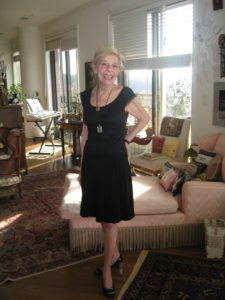
I knew the moment I met Rae that I was in the company of a unique woman. What I didn’t know at that moment was how lucky I was that our lives had crossed.
One of the first things my new employer said to me was, “I hope you’re better than my last trainer. All she did was walk me to get ice cream,” and she laughed that ornery laugh. “I knew how to manipulate her. I hope you are going to be tougher on me than that.”
Classic Rae- being herself was never a problem.
Rae was bold. She wasn’t about to take an ounce of grief from anyone and you knew it. She had lived a life of her choosing and she took responsibility for it. That’s why she abhorred anyone who didn’t do the same. She did not suffer fools… or victims… or weaklings. I loved Rae and I never wanted to disappoint her, so I learned to be someone she could respect and that helped me in my own life.
As the months and then years passed, my time with Rae became one of the highlights of my week. She’d roll her eyes during wall squats, protest about the treadmill speed, feign weakness on the abdominal curls, but she was as lithe and energetic as a 20-year-old (she often looked like a 10-year-old rolling around the floor), and I marveled at her ability to be completely ageless in mind and body.
One day after training, Rae mentioned that she had a spot on her lung and that her son was taking her to the Doctor to have it biopsied. I went cold inside.
I said, “You’re going to be fine. You feel great!” and she agreed. She felt fine; she felt great. Nonetheless, I asked her if I could call her after she went to the oncologist to see how it went. I also told her she didn’t have to pick up (Rae valued her privacy), but that I would call anyway.
I was with friends for dinner but snuck away to the ladies room at the appointed time to call her. I was relieved when she picked up. I thought this was a good sign.
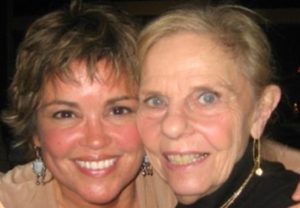
“Fine darling. Fine.”
“How did it go at the Doctors today?”
“Well, I went, and David went. And I have lung cancer.”
“Oh, Rae. I’m so sorry.”
“Yes, well I asked the Doctor about it and it’s spread to several places.”
“Oh, Rae. I’m sorry.”
“Well then I asked what stage it was, and the doctor said 5. Then I asked her how many stages there were, and she said 5.” (with humor!)
I said nothing. I couldn’t because she didn’t want tears from me.
“And so,” she continued,” I asked how long I had to live without chemo and I didn’t like that response… so I guess I’m going to have chemo. We’ll just see.”
“Well you know I’m here for you.”
“I know that darling.”
I think she sensed I was going to say something schmaltzy so she interrupted, “But Dr. Holt called today, and I got some good news.”
“What was that?”
“My mammogram came back, and I don’t have breast cancer!” and we both laughed. That was Rae. She died in 2009.
When I begin to feel sorry for myself because my back hurts, or my hip hurts, or my butt or face is drooping, I think of Rae.
Because Rae never cared about age. She never seemed like a woman of 75 or 80 or 82. She was beyond it. She was simply Rae and that example was only one of the magnificent gifts she gave me.
Thank you, Rae.
Perhaps the better title would be “in praise of the teacher” because who is the student without our teachers?
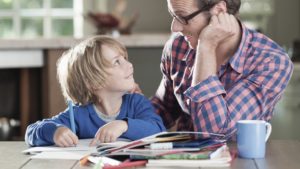
I think about Stella Jacobi, my 6th grade teacher, a diminutive force of nature who inspired me to achieve more than I’d previously conceived; Laraine Sheehan Gordon, my high school English teacher whose exacting eye and commitment to excellence pushed me to understand the immense power of words; and Elaine Fischer, an 89-pound black haired whirl of energy who believed I could lead exercise classes despite the fact I totally bombed my audition.
I was terrified of Elaine, but her belief in me changed the course of my life.
There were other teachers, too- the ones we don’t immediately thank for their instruction- bad boyfriends and bosses and backstabbing acquaintances. Perhaps their lessons are the most important because they wound the most. In retrospect, I’m the most grateful to the difficult people in my life because they challenged me to summon strength, resilience and compassion I didn’t know I possessed.
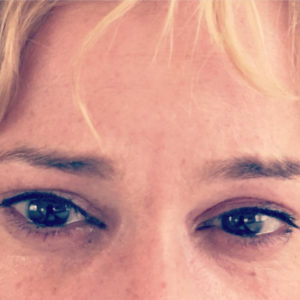
Being broken doesn’t mean being crippled- it does mean being vulnerable and it’s taken me a long time to see the courage in that.
If we are aware and open, our opportunities for learning abound daily.
A chance meeting at a networking event, the impetus to write a favorite author, accepting a random invitation to lunch, agreeing to hang upside down in a piece of fabric; life-changing opportunities are literally available in every moment of every day- if we are open to them. That’s where we must celebrate the learner.
Learning requires presence, curiosity, listening, and enthusiasm. Apathy, indifference, and arrogance are the enemy of learning because we already know it all.
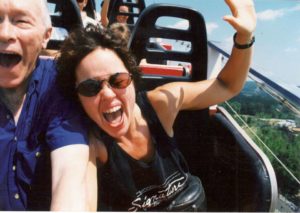
He was funny and kind and the worst joke-teller in the world. He taught me how a woman deserved to be treated, and ready to remind me should I temporarily forget.
He held me close when I was weak and loved me when I behaved like an ass. He never scolded, never acted disappointed, never let me feel sorry for who I was. His love was unconditional- as bright, expansive and as natural as the morning sun.
My Father taught me a simple and important lesson: the power of our belief in another person’s worth and well-being. As humans, there is nothing more we crave and nothing more important we can share.
Thank you, Dad, for believing in me. Thank you for teaching me to be open to life and ready to learn. I really miss you, but I feel you every day- in every sunrise, every laugh, every soft listening moment, you are with me.
I wish I didn’t but I do. I have issues; more than a couple.
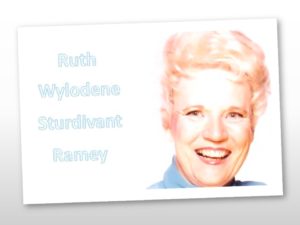
Ruth Wylodene Sturdivant Ramey had a big name and even larger presence.
She weighed 89 pounds when she got married, a diminutive, complicated combination of waif and warrior. My Mother played both princess and martyr; she, the consummate shapeshifter whose presence, though loved, was not to be trusted. This planted within me as a child, a quiet bud of longing that took root until I too became a shapeshifter, never quite sure of my center.
It happens a lot. Despite our best efforts to defy, know better, and resist the pull of our past, many of us still end up becoming our parents. I find this ironic and also hysterical.
I spent the larger part of my life disgusted and impatient with my Mother. I thought she was weak, manipulative, and narcissistic. I was embarrassed by her inability to manage her emotions, be consistent or take responsibility for her behavior. She was everything I did not want to be, and that resistance to her left its mark. I nursed a secret aversion for the feminine, a misogynis, afraid that being female also meant you were weak, indecisive, and irrational. Predictably I cultivated the more “masculine” parts of myself.
I took charge, pursued success, and denied vulnerability. I then systematically cut my losses when things didn’t work out for me. I stuffed my emotions by overworking, overeating and overdrinking . I then took it to the other “extreme” and over exercised to try to right the ship.
And for a long time, it worked- sort of. There were jobs’ lost and relationship troubles and divorces, but through it all, I remained stubbornly hopeful and certain my life was on the right path. My sons grew into men, my businesses expanded and I met a man who loved me, challenged me and made me laugh.
I began to believe I might deserve this happy life and gave myself permission to enjoy it.
Last year was difficult, unexpected and distinctly unwelcome. I thought I had done the work necessary to be a fully present, balanced and loving adult, but I was wrong. The old shapeshifter resurfaced, adrift again, only this time it was worse, much worse because I’d believed myself to be so grounded, and faithful and true.
I didn’t see the hole, but I fell anyway, grasping for handholds that weren’t there. From the bottom, I could see the light above but had neither the faith nor the motivation to muster the climb.
Time passed. Things happened. People helped me.
The other part of my “Mother” story is the fact that before Ruth Wylodene was my Mother, I had another one, the Mother that gave birth to me. This Mother was unmarried and could not keep me, despite the fact that she was already raising my brother. This Mother planted the first seeds of fear and shame in me because even in the womb you can tell when you’re not wanted.
When I was in my early forties, living large and in charge as the manager of a local health club, I decided it was time to find that birth Mother. Adoption records were sealed in the state of Missouri, so I had to hire a private investigator – Laura was her name- to help me find her. She was an intermediary, designated to make contact so that my Mother and I could finally connect.

I explained to her that when you’re adopted, it’s like having your portrait painted on glass- I needed her to give me the background to give context to my features.
The process moved slowly despite my anxious inquiries for updates. I picked up the phone at work one day and was surprised to hear Laura’s voice on the line. I wasn’t expecting her to call me, so it took me awhile to process what she was saying.
“No more contact,” she repeated. Your mother returned your letter with the words, ‘No more contact’ written on the outside.”
“No more contact? So, is this is it?”
“I’m afraid so. It’s her choice.”
I put down the phone and began to sob. Crying was something I didn’t do back then, especially at my workplace, but I did that day.
I don’t know with whom I was angrier- her for rejecting me, or with myself for believing she wouldn’t.
I gathered my things and quietly left work. I sat in my car for a long time until it was time to pick up my son Sean from school. He was eight years old.
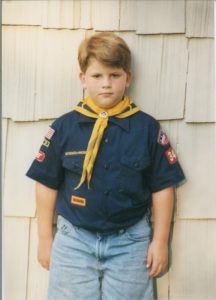
“Nothing’s wrong sweetheart. I’m just tired,” but it was obvious I’d been crying, and that meant something was definitely wrong. We drove a few minutes in silence; I could feel him staring at me.
“Mom! What’s wrong? Are you sick?”
“No, I’m not sick. I’m fine. I just had a bad day.”
Always the sensitive soul, Sean, now near tears himself said, “Mom, you’re scaring me. What’s wrong?”
I pulled the car off the road, exhaling as I explained what happened, “Something happened today Sean and it has NOTHING to do with you and I am not sick.” I told him how I’d been adopted and that for years I’d wondered who my parents were and why they would give me away. I hadn’t told him or pursued it because I didn’t want to hurt Grandma and Grandpa. Finally, I’d hired someone to help me locate her, and they had.
“Today the lady called and said they’d found my birth Mother, but she’d sent my letter back and wrote on the envelope NO MORE CONTACT” at which point I burst into tears.
In that moment, I felt stupid and sorry I’d exposed my son to my pain. He just looked at me for a few seconds, thinking. Then he said, “Well I’m sorry Mom but she must be a “B,” because who wouldn’t want to know YOU.”
His innocent compassion catapulted me back into the present.
What did it matter what she thought of me? I was his Mother and he loved me unconditionally. His honesty offered a profound spiritual lesson: focus on what is and let go of what is not.
This was the moment that mattered, sitting in the car on the side of the road with my eight-year-old, not some story about a stranger who, for whatever reason, chose not be in my life.
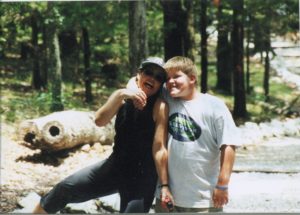
Longing, loss, and heartbreak have been recurring themes in my life. But so are loving big, laughing hard, taking risks and pushing my limits.
I’ve been told I need to learn to let go of control, accept help and be vulnerable- in short, embrace my feminine side. I wouldn’t disagree, but it still makes me smile. “Working” on this isn’t the answer- it’s much harder to simply accept, trust and let go.
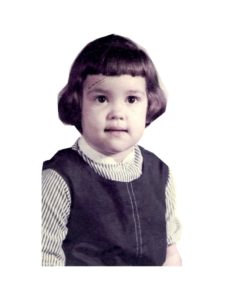
I’m not sure why I chose to believe their decisions were my fault; that somehow I was damaged, unloveable or wrong. I suspect it was simply because I was a kid who wanted to feel loved.
I like the poet Rumi’s words, “Your task is not to seek for love, but merely to seek and find all the barriers within yourself that you have built against it.”
That sounds true to my heart, and I’m just going with it.
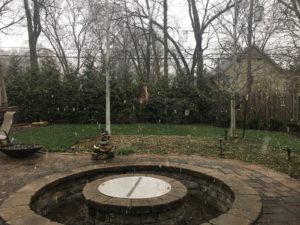
Recently I have been bone-tired, feeling sluggish, bloated and off-center physically which, I have attributed to a new awareness of my age. Alex, my Arvigo therapist, also suggested it is the result of the work we are doing together- as I have let go of lifelong trauma stored in my body, I have softened and am more connected with how I really feel. I am smiling right now because a larger part of me liked feeling a bit taut, tense with adrenaline, even if that energy came from anxiety and holding and grief. Now, it seems, I am softer and more compassionate, but tired and still dealing with anxiety and grief.
I know from experience this is temporary- that in fact, it is simply life. I also know that my feeling the pain is not as painful as my resisting pain, and if I am honest with myself, that is probably the reason I am exhausted and sad. Bracing simply isn’t as effective as it once was, taking more energy because my spirit has shifted and doesn’t flow that way anymore. Of course, embracing the pain because is the lesson here. Embracing what “is” is always the lesson.

The book uses 59 slogans and simple commentary to help train our minds when we run into resistance in our lives. This resistance is innate, so these slogans can pack a powerful reminder if we employ them. It’s mindfulness training to help us remember we have a choice- not simply a reaction to every moment.
Four Reminders for your daily life—- try to:

Of course, that should be the easiest thing in the world, because they are just trying to help me remember that the pot of gold that is already mine; but as a human, an emotional human, I tend to forget, be fearful and want to insinuate myself against the flow of the Universe. Seems kind of funny as I actually write this.
In Buddhism, the belief is that we can use everything we encounter in our lives, pleasant and painful, to awaken genuine, uncontrived compassion. By making friends with what we reject, what we see as “bad” in ourselves or others, or learning to be generous with what we cherish and see as “good”, we can gradually reach Bodhichitta, or “awakened heart.” This is something we already have but usually have not yet discovered. Our confusion and misery come from not knowing that the gold is right there- but unnoticed, from always looking somewhere else.
The Lojong’s message is that if it’s painful you can learn to hold your seat and move closer to that pain. Reverse the usual pattern which is to split, to escape. Go against the grain and hold your seat. Lojong introduces a different attitude towards unwanted stuff; if it’s painful, you become willing not just to endure it, but embrace it, to let it awaken your heart and soften you.
And if we experience something that is delightful or pleasant, usually we want to grab it and make it last. We’re afraid it will end. We’re not inclined to share it. The Lojong teachings encourage us to think of other people and wish for them to feel that way too- to share the wealth and be generous with your joy. Give away what you most want. Be generous with your insights and delights. Instead of holding tight, fearing that they’re going to slip away, open up and share them.
Whether it’s pain or pleasure, with practice, we begin to let our experience be as it is, without manipulating it, pushing it away, or grasping for it. The pleasurable aspects, as well as the painful ones, become our key to awakening our Bodhichitta- our hearts.
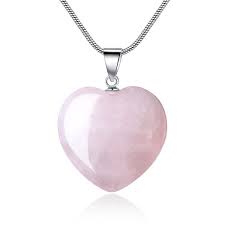
Standing down. Not my strong suit, but I’m trying to accept that, too. If the robin can, perhaps I can, too.
I’m guilty. Maybe you are, too.
When someone we care about is having trouble, we want to help them, intercede, solve their problem. This presents itself in many ways- rescuing, enabling, justifying, or appeasing them. Alternatively, it may be distancing, judging them, and becoming impatient. Either way, we forget one fundamental truth: each of us is fully capable and wholly responsible for defining the course of our own lives.
Instead of viewing this as the very essence of our time on Earth, a remarkable gift and opportunity for learning, we often choose to suffer, resist, eradicate or deny the issue. This is what causes pain.
I’ve spent a lifetime wanting to help others.
Without hesitation, I offer advice, remedies, strategies, and solutions. I see pain and I know how to fix it- why wouldn’t I explain how?
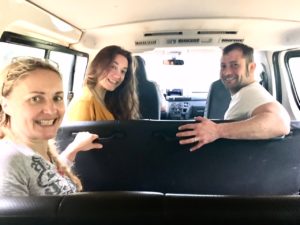
Her wish was granted and she woke up to find her pelvis shattered requiring multiple surgeries, inscrutable pain and months of physical therapy. She was returned to life, but it was a much different life than before.
When I heard her story, it was hard to believe she’d had to learn how to walk again because she looked completely whole.
On a day trip to Tikal, she quietly shared her worries about being able to handle the rigors of the day. She was apprehensive, and at that moment seemed fragile to me. Aware of this, I worried about her as we hiked, climbed and ascended staircase after staircase to view the ruins. Many times I checked myself, wanting to ask her if she was all right, but I didn’t. I realized my worry was not required- in fact, it would have disrespected her experience that day.
Instead of hovering and reminding her of her challenge, I simply asked, “How’s your butt?”
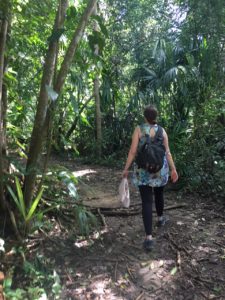
She also told them how wonderful it was to discover she was up to the task, stronger than she believed, marking a significant milestone in her recovery.
As I listened, my eyes welled with tears. Her story not only inspired me but shed a huge light for me as well. In the guise of helping others, I’d often overstepped my boundaries by either giving unsolicited advice, urging a certain outcome, or secretly judging, withholding compassion, and distancing myself.
It’s natural to want to help others. The issue isn’t the help itself but the intention behind it.
Now when I hear myself giving advice or providing an agenda, I check in with myself to see if it’s triggering some need within me to fix, control or make the world right.
As a child, I learned early that pleasing was a way to feel loved, safe and accepted. That meant being hyper-vigilant, always ready to remedy, repair, or make better. This wasn’t all bad as I’ve gone on to create a business centered around service and helping others. But as an adult, I also realize, it’s not my responsibility to fix, cure or change anyone else.
Who am I to think I know better what is best for someone else? The arrogance has been so well disguised I didn’t recognize it. When I give advice, suggest solutions, urge action, whose agenda am I really invested in- theirs or mine?
This isn’t just a boundary issue. This is a spiritual issue.

I took that to mean that we are all one Soul connect to one Source. But each Souls journey to Source is entirely their own.
What is Source? I think it is LOVE. And Love simply IS.
It has no need to attach, make right, insinuate or adjust. Love is not attached to an outcome. Outcomes, agendas, judgment, needing to feel helpful… that’s something else altogether- that’s Ego, the real cause of our separateness and suffering.
As I’ve gotten older, perhaps because I feel time differently, perhaps because overall I fear less, I like putting myself in situations that scare me… in a good way.
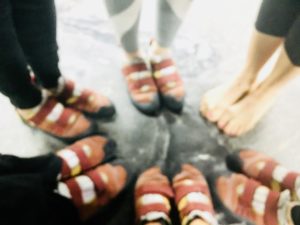
While we were excited to be together, I could also sense some apprehension as we laced up our climbing shoes and teased one another about the way our butts looked in the harnesses. Looking up at the little mounds and hand holds on the 30 foot walls, we were secretly thinking, “Will this be fun? Will it be too hard? Will I be able to do it? That looks awfully high.”
Ulysses, our playful but instructive guide got us going on the walls quickly. When asked who wanted to go first, I volunteered, mostly because no one else did. I’d had climbing experience, mostly on ice, so I felt like I should lead. “You look like the fearless leader,” quipped Ulysses.
Little did he know.
Unlike my experience on ice, ROKC offers self belay which means you are held safe to the wall by a top side rigging system which is triggered by the movement and weight of your body. Simply stated, when you need the rope to hold you, it is there. But, you need to trust it.
As I climbed the beginners path , feeling the gentle tug of the belay and finding the handholds and footing secure, my confidence soared and I scrambled up grateful for the ease. When it was time to let myself down, Ulysses instructed me to sit back and let the rope catch me so I could safely traverse back down.
So I did, only I didn’t.
When I sat back, there was a slight delay before the rope caught me and I freaked out, twisting and flailing into the wall several times before landing with a thud on the (padded) floor. I looked up at Ulysses accusingly, “What happened?” “You didn’t sit back and walk down.” Which, of course, was true. What he didn’t say was, “You didn’t trust the rope you control freak.”
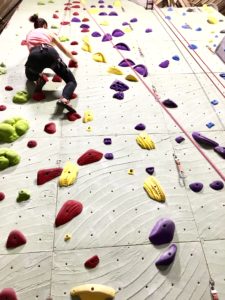
A few predictably soared. Cara, a natural athlete and rock star, negotiated her way up the rock like a pro. Megan and Kristin, young and lithe, skipped up the rock like little ponies.
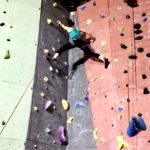
By evenings end, we all felt accomplished and agreed it was a great team challenge.
Ulysses, sensing my reluctant desire to push further, offered to belay me as I went up a more advanced route. As I picked and clawed my way up I felt his support on the rope which felt good and familiar.
But it wasn’t enough when I found myself perched, spread eagle, and precariously unbalanced. Tired and clinging, my left leg, deeply flexed and unstable, simply refused to work. My left hip, having endured three hip replacements, simply refused to work I tried and tried to make my muscles work, but it was not happening.
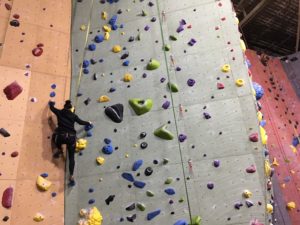
Frustrated, I said, “I’m done! I can’t do this. It’s my hip- I’ve had it replaced and it’s not working! Let me down.”
“Just rest for a minute. I’ve got you.”
I just hung there, totally annoyed at this man child who had no compassion for a geriatric like me. How old was he anyway? Thirty? I was tired, pissed and uncomfortably exposed. What else could I do? I inhaled; and then I exhaled.
“Okay, now,” Ulysses coached, “look to your right.”
I barely heard him because I was pouting. “What?” I snapped back.
“Look to your right.”
And as I looked to my right, of course, I saw it- another option- another way up. I hesitated before I let my left leg down (actually it slipped off the foothold), and gracelessly moved my body to the handhold to the right. With his help, I also found my footholds and breathing heavy, clinging to the wall, grateful to have made it, came face to face with a child of about ten years old, passing me on the climb.
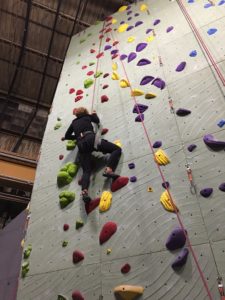
My fear had gotten the best of me and I’d panicked, using my hip as an excuse. Fear not only blinded me to finding another solution but threw me directly into victim mode. Gross.
Thankfully Ulysses was there to remind me I had choices. I climbed the rest of the way up, right beneath that ten year old and felt really, really good about it.
When the evening was coming to a close, I asked Ulysses how old he was. He was twenty four; younger than my youngest son. I smiled at that and gave him a good tip.
I hope he’s my coach again, because you know, I have to go back.
The truth about body obsession, self- loathing, and longing…
As someone who has worked in the health and fitness arena for over thirty years, I’ve seen and experienced my fair share of body obsession and all its incarnations. By body obsession, I mean our endless pursuit of a better body, weight loss, and perfection, based on the misconception that once we lose that last 10 lbs we will somehow be “better” “more acceptable” “more powerful” or “more loveable.”
You might think this is ironic since as a trainer and fitness guru, I’ve spent my entire life talking about self-improvement via weight loss, exercise, and nutrition.
We say want to “be healthy” to “feel better,” but really, what does that mean? I’ve seen clients lose and then gain hundreds of pounds, not because they were weak, lacked motivation or were unprepared. Their heads were totally in the game- the part that was missing were their hearts. It’s impossible to take good care of yourself when you’re at war with yourself. Fear, self-judgement, procrastination, apathy, sarcasm- these are just a few of the ways we sabotage, prolong, or deny ourselves true health, joy and happiness.
At War…
One of the most common expressions of this war is a pre-occupation and dissatisfaction with our bodies. We don’t like our thighs, our bottoms are too big or too small, the skin on our belly and arms is beginning to sag.
Tom, a friend of mine, refers to his body as a “Meat sack.” A deeply spiritual person, Tom encourages others to simply appreciate the miracle of our body and cherish it as our physical home on Earth. Our bodies and consciousness are deeply connected and yet, we act as if they weren’t.
When we lack respect for the body’s tireless service to us (despite our abuse and misuse), no amount of “application” (ie. dieting, exercising, and wardrobing) will change how peacefully or joyfully we live in them. Accepting and valuing our bodies, imperfections and all, is the first necessary step toward healing that hole in our heart; that pit we feed with our fear, shame and feelings of unworthiness.
In her book, The Answer is Simple- Love Yourself, Live Your Spirit, Sonia Choquette writes about the body, “To love yourself, you must love your body as well- it comes as a package deal. No matter what kind of body you ended up with, it’s the only one you have, so you must live with it whether you want to or not. Realize how important your physical self to your life’s journey- not for the approval it wins from others, but for the service it provides for your Spirit. It’s your vessel, your carrier, your means of experiencing life. Like a car that gets from point A to point B, it’s your mode of transportation on Earth and will work much better for you if you treat it with a little respect and care.”
The Struggle is real…
As someone who has struggled for years with my weight, body image and self-acceptance, I was constantly looking for love in wrong places. This has included desperation dieting, over-exercising, obsession with perfection and punishing myself for my repeated “failures.” My only real failure was to deny the fact that I was already loveable, whole and okay. Once I set about doing the inside work, the impetus to care for my body fell right into place. That’s because mindset and motivation, like our body and spirit, are inseparable.. we can’t have one without the other.
Letting go to have more…
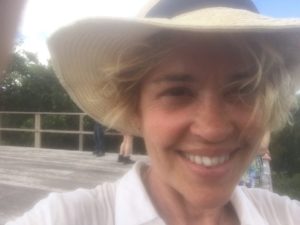
It’s respect for the little moments which add up to the big moments which define the quality of this life I have. I don’t want to miss another moment because I’m feeling “fat” or “depressed” or simply “less than.”
That’s a decision- that’s an agreement that I no longer entertain nor accept. Life is short and amazing. I don’t have time to waste making choices that don’t support me, my dreams, my relationships or feeling freaking fantastic.
Come to think of it, none of us do. So why not choose to celebrate? It’s so much more fun.
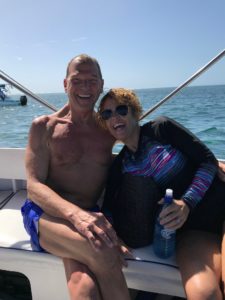
When I told Herb I was planning a work retreat in Belize, I could see the wheels spinning behind his blue eyes. He likes to be with me and I could tell he was angling for a way to be in Belize as well. I knew that, of course, and we made plans for the two of us to go down a bit early to play and prepare for my retreat.
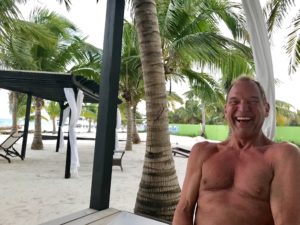
We knew we’d make it, but it wasn’t fun and it wasn’t pretty and there were scars. This trip and our trip to Greece over the holidays was to rest, heal and start anew. And that’s what we did.
One of the things I love about Herb is his generosity. I don’t understand “frugal” or “cheap” even though I’ve never had any money in my life before. I always tell Herb how much I appreciate that he treats me to places I’d never have been able to go before, to which he replies, “I’m treating myself, and you’re just here with me.” Which, of course, I love because it’s so untrue- he loves treating me!

Lesson learned… NEVER rent a house, no matter how amazing with a shitty property manager. It’s unnecessary stress, the worst kind.
Our Retreaters began arriving the same day Herb left the island, February 14th, Valentine’s Day. Herb was a trooper about going home as he knew #1, I would be working at this retreat, #2, we’d had a great visit together, and #3 I’d promised to come home.

For folks wary of women in groups, we proved that the stereotype unfounded. We bonded over wine, tableside talks, exercise and open discussions about what we needed to do to shift in our lives forward with more balance, health, and joy.
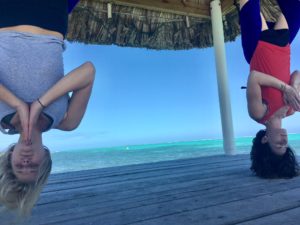
At breakfast, we met to cover educational topics including brain health, hormone balance, skin health, the benefits of meditation, eating real food and being a part of a female tribe.
After that, folks were free to rent golf carts, explore the Caye, get a massage, facial, hang out by the pool, read, walk, sleep or learn Inversion Therapy (and what a spot to do it)!

Some evenings we convened again, but often folks went off to their rooms to read, out to a local watering hole, or simply a starlit walk on the beach.
The dock next to ours was so low to the ocean that at night when you walked out on it, it truly looked like you were walking straight into the dark water. It was scary and also thrilling. One special night, Tricia Collins (friend and 1901 coach) and I held hands as we walked out that long pier.
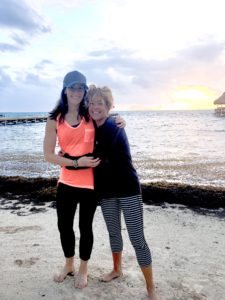
I guess what I am getting at is that in addition to learning together via planned discussions and workbooks, we also had time to learn other ways: downtime, the wind, the ocean, and the quiet. There really was time for each of us to simply BE, and that was magical.
Side Splitting laughter from a decidedly WRONG game of Cards Against Humanity, freestyle dancing to shared tunes via Spotify, and morning workouts bound us together as a group and as a tribe.
When it was time to go home, it was bittersweet. While folks knew it was time to go, it also felt wrong to have to leave so soon. I think most of us felt like close friends by the end of that retreat (closer friends if we’d already known each other.)
We had participants from as far away as Atlanta and New Jersey and all offered support and feedback for future retreats. 
There is immense power when people come together for positive change and we all felt it.
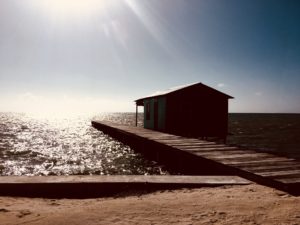
A friend of mine and I’d been talking a few weeks in advance of my trip to Belize over a personal situation that I’d been dealing with – it was really the accumulation of many months of fatigue and mild depression from the stressful year Herb and I had experienced in 2017. I was in a funk, couldn’t get out of it and felt a little desperate because I am normally a happy person. I was not happy; in fact, I was miserable, and it was time to address my issues.
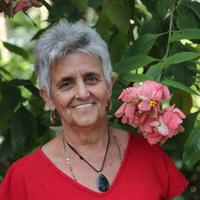
I took this as a sign and registered the same day. I had no idea what it would be like, what kind of people would be attending, or what, exactly, I was to learn. That was at once exciting and uneasy, but I was ready.
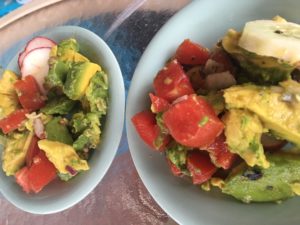

That van ride was not something I was looking forward to and as I flew over the azure water below, I had a moment of buyer’s remorse, longing simply to stay in the sky.
I calmed myself by remembering what Herb had said, “Honey, if it’s wackadoodle, you just get on a plane and come on home. You don’t have to stay.” I laughed because he was referencing another retreat that we’d both attended that was completely “wackadoodle” as in “scarycultlikeweirdos.” Let’s just say it left a mark.
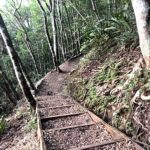
I’d asked for a private cabin if possible, (admittedly spooked by the possibility of a potluck roommate) and was relieved when that wish was granted. When one of my campmates asked how I scored that, I replied, “I asked.” Little did I know at that moment how much I would learn alone in that cabin, writing, crying, listening, and laughing in the darkness, entertained by midnight concerts by enthusiastic Howler monkeys.
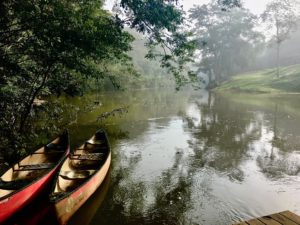
They took excellent care of us and seemed very concerned our satisfaction, so much so that I, carb-averse freak that I am, ended up eating beans, rice, chips, and tortillas all week long. One night when they served inedible red snapper (that they called Tilapia) I cut it up in little pieces and pushed it around my plate so as not to offend them, to the great entertainment of my table mates.
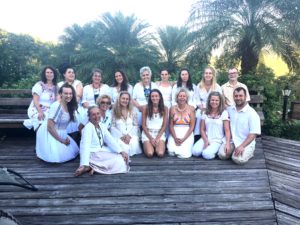
I had the opportunity to be far away from home, in a land so beautiful and foreign, I could completely immerse myself in the teachings. I made friendships I know will last a lifetime and discovered kindness beyond measure in our group.
Our teachers were strong, learned, caring and compassionate. I was unprepared for the impact this experience would have on my life: grounding, clarity and time away helped me mourn the losses of 2017 and much further back. Healing was needed and healing was provided.
The last day as we went around the room, each recapping our experience together I said, “I came here to reclaim my faith, somehow missing the fact that I came here on faith.” That kind of sums it up for me. In the busyness and overstimulation of our life in these United States, it’s easy to forget we already possess all we’re seeking. Like love, and value, and grace, and well, faith.
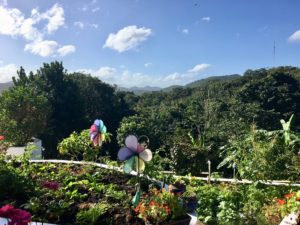
Our rituals are gone, our connection to one another is on life support, and our sense of shared values is decimated daily by the news. Our children are killing one another and the best protection we have to offer is more guns to arm the teachers? No wonder it’s hard to have faith these days.
But we must. We must wake up each day and ask ourselves what it is we can do to make our world better. That means taking action each day to be positive, be still, stay grounded and be a conduit for love. If that sounds naive or Pollyanna, I don’t care because we all have that choice to make.
Love or fear?
It really all comes down to that. Sounds simple, and I guess it really is. Perhaps remembering that simplicity will help us heal. It’s time.